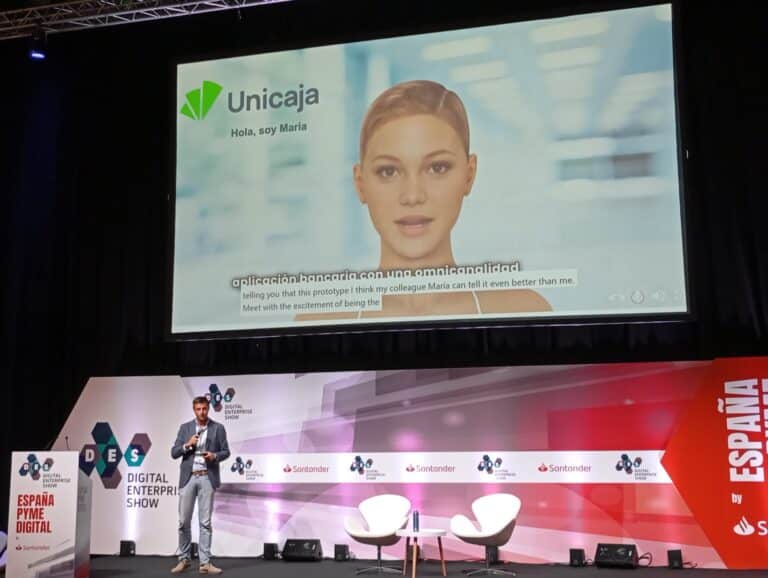As part of the DES (Digital Enterprise Show) in Malaga, Unicaja presented María, its new artificial intelligence prototype and its new conversational banking model, with which it aims to reduce the digital divide and improve financial inclusion.
Users only have to use their voice to give her orders or carry out operations, without having to press any buttons.
Maria is a sort of Alexa or Cortana, but adding non-verbal communication to verbal communication. Thus, it has a digital human aspect, adding gestures, expressions, movements, etc. to the conversation to achieve a more effective communication with the bank's customers.
"The most popular apps have in common that they allow interaction by typing or speaking. If this model was already proven, why not adapt this conversational model ourselves? We simply decided to take it to the financial sector," explained Javier Porras, director of Artificial Intelligence in Innovation at Unicaja Banco.
In addition to being a virtual voice assistant and avatar, María incorporates biometrics. Thanks to this technology, the AI can identify each user by the characteristics of his or her voice.
With this new feature Unicaja hopes to embrace omnichannel banking. Thus, AI can be used seamlessly on the web, mobile devices, smart watches, cars, etc.
During the DES it has been demonstrated the ease with which Maria can be used to carry out an operation as common today as making a Bizum. The AI asks the amount and the concept you want to put and requests confirmation from the user, closing the whole process in a few seconds.
Maria's utilities
This artificial intelligence will not only allow the same services already offered by digital banking, but will also provide new value-added services motivated by this conversational context.
Unicaja defends that Maria helps to improve financial health by analyzing what has already happened in each bank account, to which its predictive and prescriptive skills and proactive proposals are added. Customers can ask her how much they have spent, on what and find savings and investment opportunities.
Opportunities it presents
As Unicaja's head of artificial intelligence explained, Maria represents an opportunity in three ways. Firstly, it reduces the digital divide to boost digitization. The idea is to promote automation and thus efficiency.
In addition, the assistant makes it possible to advance financial inclusion. Thanks to the entity's AI, the elderly and people with disabilities will be able to easily make their transactions without depending on others. Porras has particularly highlighted its usefulness for blind people and people with Parkinson's disease or other motor problems.
"Maria brings more empathy, understanding and trust with customers. But thanks to generative AI, she can also see," he said. In this sense, the technology will be able to 'read' receipts or check how a customer reacts to a commercial offer and adapt it to the emotions or sensations it produces.
Finally, Maria can improve security by incorporating biometrics in the conversational context. According to Unicaja, AI can detect voice cloning and recordings, i.e. when the sound is not being produced from a throat.
Biometrics does not analyze the content of what is said, but the vocal characteristics, such as timbre, frequency, pitch and other parameters.
Within the field of security the new assistant would also make it possible to fight phishing. "As it is all conversational, the typical SMS pretending to be Unicaja that users may receive on their cell phones will no longer make sense," said Porras.
Finally, at a business level, the bank maintains that María will help it to reinforce its brand image and increase customer loyalty and customer acquisition.






